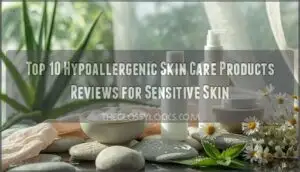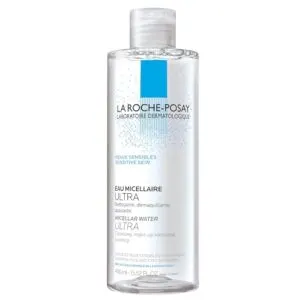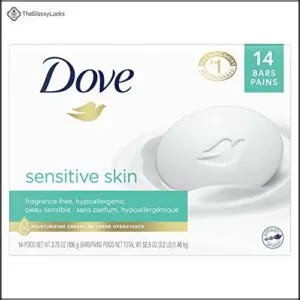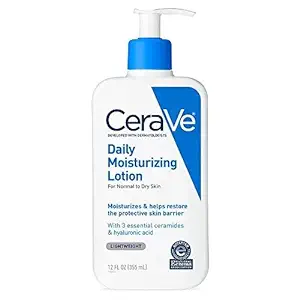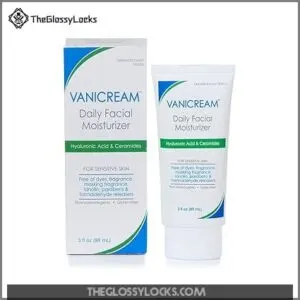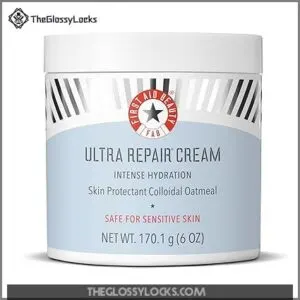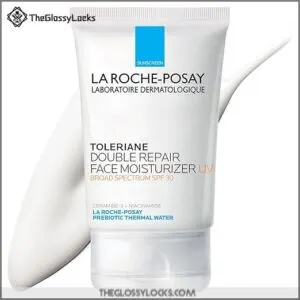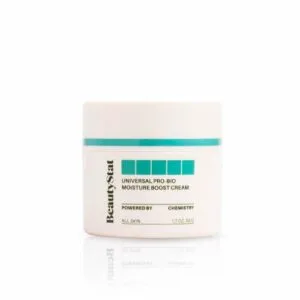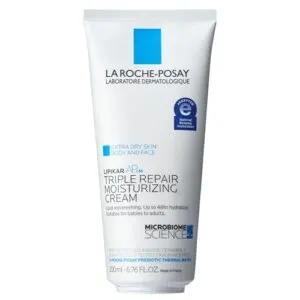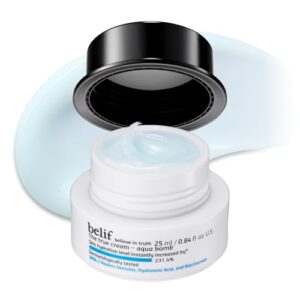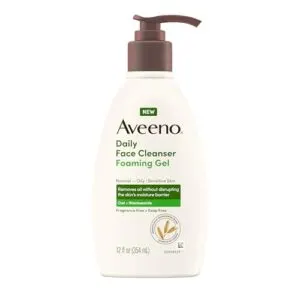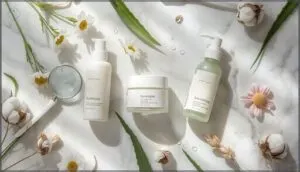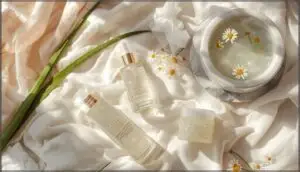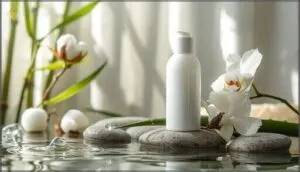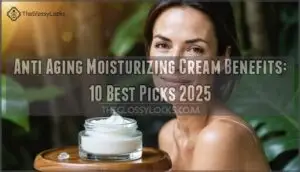This site is supported by our readers. We may earn a commission, at no cost to you, if you purchase through links.
Your skin reacts to nearly everything. A new moisturizer triggers redness. Your favorite cleanser suddenly stings. That sunscreen everyone raves about leaves your face itching for hours. You’re not imagining it—contact dermatitis rates have tripled since 1996, and roughly half the population now experiences sensitive skin.
The culprit often hides in plain sight: common allergens like synthetic fragrances and preservatives that sneak into even “gentle” formulations. Hypoallergenic skin care products reviews reveal which options actually deliver on their promises by stripping out these irritants while maintaining efficacy.
Finding products that won’t betray your skin barrier requires knowing which ingredients support healing and which ones sabotage it.
Table Of Contents
- Key Takeaways
- Why Hypoallergenic Skincare Matters for Sensitive Skin
- Key Ingredients in Hypoallergenic Skincare
- Top 10 Hypoallergenic Skin Care Products Reviewed
- 1. La Roche-Posay Micellar Cleansing Water
- 2. Dove Sensitive Skin Beauty Bar
- 3. CeraVe Daily Moisturizing Lotion for Dry Skin
- 4. Vanicream Daily Facial Moisturizer Sensitive Skin
- 5. First Aid Beauty Ultra Repair Cream
- 6. La Roche-Posay SPF 30 Moisturizer
- 7. BeautyStat Universal Pro-Bio Moisture Cream
- 8. La Roche-Posay Triple Repair Moisturizer
- 9. Belif Aqua Bomb Hydrating Moisturizer Cream
- 10. Aveeno Daily Foaming Gel Cleanser
- How to Choose The Best Hypoallergenic Products
- Building a Hypoallergenic Skincare Routine
- Frequently Asked Questions (FAQs)
- Are hypoallergenic skincare products safe?
- What is hypoallergenic skincare?
- What are hypoallergenic treatment products?
- Which cosmetic brands are hypoallergenic?
- What is a hypoallergenic body wash?
- What is a hypoallergenic moisturizer?
- Can hypoallergenic products completely prevent allergic reactions?
- How long does patch testing take?
- Are natural ingredients always safer for skin?
- Do hypoallergenic products work for all ages?
- Conclusion
Key Takeaways
- Hypoallergenic products reduce irritation by excluding common allergens like synthetic fragrances and preservatives, though the term lacks FDA regulation and 83% of marketed hypoallergenic moisturizers still contain potentially problematic ingredients.
- Ceramides, glycerin, squalane, and colloidal oatmeal strengthen your skin barrier and lock in moisture without triggering sensitivity, while you should avoid fragrance, sulfates, parabens, and high concentrations of acids or retinol.
- The most effective hypoallergenic products include La Roche-Posay Micellar Water for makeup removal, CeraVe Daily Moisturizing Lotion for 24-hour hydration, and mineral sunscreens with zinc oxide for UV protection without chemical irritants.
- Build your routine by introducing one new fragrance-free product every two weeks, always patch test behind your ear for 48 hours, and apply products in order from thinnest to thickest texture after cleansing damp skin.
Why Hypoallergenic Skincare Matters for Sensitive Skin
If your skin reacts to most products with redness or irritation, you’re not imagining things. Nearly half the population reports having sensitive skin, and contact dermatitis rates have tripled since 1996.
Understanding why hypoallergenic skincare works differently can help you choose products that protect rather than provoke your skin’s natural defenses.
Common Symptoms of Sensitive Skin
When your skin feels like it’s constantly protesting, knowing the signs helps you respond with the right care. Sensitive skin presents a distinct pattern of symptoms that point to a weakened barrier needing targeted protection. A damaged skin barrier is often associated with sensitive skin conditions.
- Facial redness and irritation: 77% of people with sensitive skin report persistent redness, often with bumps or flushing
- Itching sensations: The most common complaint, affecting over 70% of sensitive skin cases globally
- Skin dryness and tightness: Present in 61% of individuals, often with flaking or scaling
- Product reactions: 40% experience adverse responses to personal care items, including skin redness and swelling
- Sun sensitivity: UV exposure triggers heightened pain and irritation in compromised skin
Triggers and Environmental Factors
If redness and itching sound familiar, look closer at what’s around you. Air pollution, climate extremes, and a fast-paced urban lifestyle can all ramp up skin sensitivity. Even “hypoallergenic” products sometimes contain hidden allergens.
Indoor factors like dry heating and airborne pollutants add to irritation, making identifying skin allergens a daily challenge. Prolonged exposure can compromise the skin’s natural barrier function.
| Trigger | Example |
|---|---|
| Air pollution | PM2.5, NO2 |
| Climate extremes | Heat, humidity |
| Urban lifestyle | Stress, sleep |
| Product interactions | Allergens, fragrances |
Benefits of Allergen-Free Formulations
Switching to allergen-free skincare offers more than temporary relief. These formulations reduce irritation by excluding common allergens like parabens and artificial fragrances, strengthening your barrier support naturally. Here’s what you gain:
- Lower risk of allergic contact dermatitis by nearly 30%
- Improved moisture retention across all skin types
- Harmful exclusion of pore-clogging ingredients
- Reduced redness and itching episodes
- Long-term protection against new sensitivities
The hypoallergenic skincare market’s projected growth to USD 11.8 billion by 2035 reflects rising consumer confidence in these gentle, effective solutions.
Prevalence and Market Trends
You’re not alone if you struggle with sensitive skin. A recent global meta-analysis found that 71% of adults report sensitivity, with women disproportionately affected. The anti-allergenic skincare market reached USD 5.4 billion in 2025 and projects to hit USD 11.8 billion by 2035, reflecting massive demand for hypoallergenic skincare solutions.
| Market Indicator | 2025 Value | 2035 Projection |
|---|---|---|
| Global Market Size | USD 5.4 billion | USD 11.8 billion |
| US Market Share | USD 1.14 billion | 6.0% CAGR growth |
| India Growth Rate | 16.2% CAGR | Leading expansion |
| E-commerce Share | 53% of sales | Continued dominance |
Regional variations highlight fascinating consumer preferences. India’s market growth leads at 16.2% CAGR, driven by urbanization and dermatological awareness, while China follows at 14.4%. E-commerce trends dominate distribution, capturing over 53% of sales as consumers prioritize fragrance-free formulations and ingredient transparency.
Product innovation focuses on barrier-repair creams and clean-label options, with brands like La Roche-Posay and CeraVe leading through dermatologist-tested claims.
Key Ingredients in Hypoallergenic Skincare
When you’re shopping for hypoallergenic skincare, understanding the ingredient list can feel like reading a foreign language. The good news is that certain ingredients consistently prove themselves gentle and effective for sensitive skin types.
Let’s break down the key players you’ll want to look for—and the ones you should skip.
Glycerin for Hydration
Glycerin is one of the hardest-working ingredients in hypoallergenic skincare products. This humectant pulls moisture into your skin and locks it there, boosting hydration by up to 59% within an hour.
You’ll find it in moisturizers at concentrations between 10% and 20%, where it aids barrier function without irritation. It’s safe for sensitive skin and won’t clog pores.
Ceramides and Skin Barrier Support
Your skin barrier is like a brick wall—and ceramides are the mortar holding it together. These lipids make up 50% of your stratum corneum and directly prevent water loss.
Ceramides are the mortar in your skin’s brick wall, making up half your barrier and locking in moisture
Clinical trials show ceramide skincare products reduce TEWL by 25% within two hours and boost lipid levels considerably.
For those with ceramide deficiency or AD management needs, hypoallergenic ceramide formulations restore barrier function without triggering sensitivity.
Squalane and Colloidal Oatmeal Benefits
When your barrier needs serious repair, squalane hydration and colloidal oatmeal soothing deliver proven results. Squalane cuts trans-epidermal water loss and reduces redness by 37% in four weeks—no pore congestion.
Colloidal oatmeal confronts eczema relief head-on, improving symptoms by 20% within three days in over half of atopic dermatitis patients.
Both hypoallergenic moisturizers strengthen sensitive skin without triggering flare-ups.
Ingredients to Avoid for Sensitive Skin
Avoiding trigger ingredients cuts your risk of contact dermatitis by half. Fragrance allergens top the list—36.6% of “natural” products contain them despite hypoallergenic claims. Alcohol content strips barrier lipids and worsens inflammation.
Sulfate risks include a 42% jump in irritation during patch testing. Preservative dangers like quaternium-15 provoke reactions in 22.3% of sensitive individuals.
Even acid exfoliants double irritation when combined with retinol. Choose fragrance-free formulas without parabens or sulfates.
Top 10 Hypoallergenic Skin Care Products Reviewed
Finding the right products for sensitive skin doesn’t have to be guesswork.
The following ten hypoallergenic options have been vetted for their gentle formulations and minimal allergen profiles.
Each product targets specific skincare needs while keeping irritation risk low.
1. La Roche-Posay Micellar Cleansing Water
La Roche-Posay’s micellar cleansing water uses micellar technology to lift away dirt and makeup without harsh rubbing. This dermatologist-approved formula removes 99% of foundation and 69% of mascara with a single application.
You get a three-in-one solution that cleanses, tones, and removes makeup in one step. It’s hypoallergenic, fragrance-free, and gentle enough for sensitive eyes. The no-rinse formula keeps your skin hydrated and comfortable.
Consumer reviews on platforms like Walmart average 4.6 out of 5 stars, with users praising its effectiveness for facial cleansing for sensitive skin.
Best For: People with sensitive skin who want an effective, no-rinse makeup remover that won’t irritate their eyes or leave their face feeling stripped.
- Removes 99% of foundation and most makeup in one step without harsh scrubbing or rinsing required.
- Dermatologist-tested and fragrance-free formula that’s gentle enough for sensitive skin and eyes.
- Works as a 3-in-1 cleanser, toner, and makeup remover, saving time in your skincare routine.
- Some users report a sticky residue that lingers after application.
- Less effective on stubborn makeup like waterproof mascara, with only 69% removal rate.
- Price point around $20 may feel steep for a micellar water compared to drugstore alternatives.
2. Dove Sensitive Skin Beauty Bar
This dermatologist-approved beauty bar stands apart because it contains one-quarter moisturizing cream, a feature not found in typical soap bars. Key ingredients include glycerin and sodium lauroyl isethionate, creating a pH-balanced, hypoallergenic gentle cleanser free from sulfates and parabens.
The formula changes prompted some consumer reviews in 2025 noting odor concerns, but over 3,000 reviews maintain an overall 4.5-star rating.
Application methods are simple: rub between hands for a creamy lather suitable for face, body, and hands. It’s particularly effective for sensitive skin requiring daily, non-irritating cleansing.
Best For: People with sensitive, dry, or eczema-prone skin who need a gentle daily cleanser that won’t strip moisture or cause irritation.
- Contains ¼ moisturizing cream with glycerin that actually hydrates while cleansing, unlike regular soap bars that leave skin tight and dry.
- Completely free from sulfates, parabens, fragrances, and other common irritants—dermatologist and pediatrician recommended as the #1 bar for sensitive skin.
- Works everywhere (face, body, hands) and creates a creamy lather that rinses clean without that squeaky, stripped feeling.
- Some users report it leaves a slippery residue on tub floors that requires extra cleanup.
- Recent 2025 reviews mention formula changes causing an unpleasant smell even in the unscented version, along with new irritation issues for some longtime users.
- If your skin is extremely dry, you’ll probably still need to follow up with a separate moisturizer—the bar helps but isn’t a total replacement.
3. CeraVe Daily Moisturizing Lotion for Dry Skin
CeraVe Daily Moisturizing Lotion offers three essential ceramides and hyaluronic acid in a lightweight formula that delivers 24-hour hydration performance. Clinical studies show one application greatly increases skin hydration and maintains healthy moisture levels throughout the day.
The MultiVesicular Emulsion technology continuously releases ingredients, requiring only once-daily use compared to traditional emollients needing multiple applications.
Dermatologist endorsement is strong, with the lotion holding the National Eczema Association Seal and maintaining 4.5-star consumer satisfaction ratings. It remains a top-selling hypoallergenic moisturizer for dry skin and sensitive skin, priced around $18 for 12 ounces.
Best For: People with dry or sensitive skin who need fragrance-free, daily hydration that lasts all day without feeling greasy or heavy.
- Clinically proven 24-hour moisture with just one application per day, unlike traditional lotions that need reapplying multiple times
- Contains three essential ceramides and hyaluronic acid that actually repair your skin barrier while keeping it hydrated
- Dermatologist-approved with the National Eczema Association seal, plus it’s fragrance-free and non-comedogenic so it works for sensitive or eczema-prone skin
- Not specifically designed for anti-aging or acne treatment, so you’ll need separate products if those are your main concerns
- Might not be moisturizing enough if you have extremely dry or damaged skin that needs something heavier
- Price has gone up about 12% in recent years, now around $18 for 12 ounces, and bottle sizes have gotten slightly smaller
4. Vanicream Daily Facial Moisturizer Sensitive Skin
Vanicream Daily Facial Moisturizer delivers five ceramides, hyaluronic acid, and squalane in a formula free of fragrances, dyes, and parabens.
Clinical studies over four weeks confirmed significant hydration improvements and reduced irritation in sensitive skin participants. Consumer reviews average 4.7 out of 5, with users reporting no breakouts and effective layering under makeup.
The National Eczema Association Seal validates its allergen avoidance profile. Ingredient transparency is verified through independent audits. You get dermatologist-recommended performance at around $12 for 3 ounces.
Best For: People with sensitive, reactive, or eczema-prone skin who need fragrance-free, dermatologist-tested hydration that layers well under makeup and sunscreen.
- Contains five ceramides plus hyaluronic acid and squalane to strengthen the skin barrier and lock in moisture without irritation.
- Clinically proven to reduce irritation and improve hydration over four weeks, with a 4.7/5 rating and National Eczema Association approval.
- Completely free of common irritants like fragrances, dyes, parabens, and formaldehyde releasers, making it safe for highly reactive skin.
- Some users find it too rich or slightly oily when layered under certain sunscreens or heavier products.
- The lightweight texture may not provide enough moisture for extremely dry skin types during harsh weather.
- A few users report mixed results, meaning it doesn’t work universally for every type of skin sensitivity or concern.
5. First Aid Beauty Ultra Repair Cream
First Aid Beauty Ultra Repair Cream combines 0.5% colloidal oatmeal with shea butter, ceramide NP, and squalane for barrier repair and eczema relief.
Clinical studies with 21 participants documented doubled hydration immediately after application and strengthened skin barriers within seven days. The National Eczema Association Seal confirms its efficacy for sensitive skin care.
You’ll find this hypoallergenic body cream, free of fragrances, parabens, and gluten, at $34 for 6 ounces.
Note that December 2024 brought a recall of the Coconut Vanilla variant due to manufacturing issues, though the original formula remained unaffected.
Best For: People with eczema, sensitive skin, or chronic dryness who need clinically proven barrier repair and all-day hydration without irritating ingredients.
- Clinically shown to double skin hydration immediately and strengthen the barrier within a week, with recognition from the National Eczema Association
- Clean formula free of common irritants like fragrance, parabens, and gluten, plus it’s vegan and cruelty-free
- Works for face and body with a lightweight texture that absorbs quickly despite being intensely moisturizing
- At $34 for 6 ounces, it’s pricier than many drugstore alternatives
- The Coconut Vanilla version was recalled in December 2024 due to manufacturing issues (though the original formula wasn’t affected)
- Some users report a slight film on skin after application, and others have experienced reactions to the eucalyptus oil in the formula
6. La Roche-Posay SPF 30 Moisturizer
La Roche-Posay’s SPF 30 moisturizer combines UV protection with barrier repair through ceramide-3, niacinamide, and glycerin. You get broad-spectrum coverage blocking 96.7% of UVB rays while hydration claims extend up to 48 hours.
The dermatologist-tested formula excludes fragrances, parabens, and oils—its allergen profile covers all 29 ingredients as low-risk.
Consumer reception is strong with over 63,000 verified reviews averaging above 4.5 stars. Users with sensitive skin report no breakouts or greasiness at $25.99 for 3.38 ounces.
Best For: People with sensitive skin who want a lightweight daily moisturizer that combines hydration, barrier repair, and reliable sun protection without fragrance or common irritants.
- Delivers broad-spectrum SPF 30 protection with a photostable formula that blocks 96.7% of UVB rays while hydrating skin for up to 48 hours.
- Formulated specifically for sensitive skin with barrier-strengthening ingredients like ceramide-3 and niacinamide, and excludes all major allergens including fragrance, parabens, and oils.
- Lightweight texture absorbs quickly without greasiness or white cast, backed by over 63,000 verified reviews averaging above 4.5 stars.
- At $25.99 for 3.38 ounces, it’s pricier than many drugstore moisturizers with SPF.
- Some users find it less moisturizing than dedicated moisturizers without sunscreen, which may require layering for very dry skin.
- Has a faint sunscreen scent upon application that fades quickly, and isn’t available in all regions like Singapore.
7. BeautyStat Universal Pro-Bio Moisture Cream
With hyaluronic acid, ceramides, and bio-fermented bifidus, this fragrance-free moisturizer tackles barrier dysfunction through measured clinical hydration. Dermatologist-tested safety data shows zero allergic reactions across consumer reviews, and 90% of participants reported firmer skin after four weeks in trials.
You’re getting 24-hour moisture retention without greasy residue—suitable for dry, oily, and combination types. Pro-bio benefits include reduced redness and improved barrier function within two weeks.
At $50 for 1.7 ounces, it’s premium pricing for clinically validated sensitive skin care.
Best For: People with sensitive, dry, or barrier-compromised skin who want clinically proven hydration and are willing to invest in a fragrance-free, dermatologist-tested moisturizer.
- Delivers 24-hour continuous hydration with clinically measured results—90% of users reported firmer skin and 100% saw improved pore appearance after four weeks.
- Lightweight, non-greasy formula works across all skin types (dry, oily, combination) and absorbs quickly under makeup without irritation.
- Combines barrier-repairing ingredients like ceramides, hyaluronic acid, and reishi mushroom extract with zero reported allergic reactions in consumer reviews.
- Premium price point at $50 for only 1.7 ounces—some users feel the cost is high for the amount of product you get.
- Small jar size means you’ll run through it faster if you’re using it twice daily on your face and neck.
- Texture may feel too lightweight for those who prefer richer, creamier moisturizers, especially in harsh winter conditions.
8. La Roche-Posay Triple Repair Moisturizer
Backed by microbiome support research spanning over 10 years and 14 clinical studies with 14,000 participants, this La Roche-Posay moisturizer earned National Eczema Association acceptance.
Clinical efficacy shows 48-hour hydration while rebalancing skin flora through ceramide-3, shea butter, and prebiotic thermal water. Ingredient analysis confirms zero fragrance or parabens.
User acceptance is high—dermatologist endorsement from 90,000 specialists worldwide backs its safety for sensitive skin, eczema, and even cancer patients. Product reviews note a rich, non-greasy texture.
At $18.99 for 6.76 ounces, it’s an accessible hypoallergenic body cream with serious clinical credentials.
Best For: People with eczema, very dry or sensitive skin who need clinically-proven, dermatologist-recommended relief that works for 48 hours without irritating ingredients.
- Backed by serious science—14 clinical studies, 14,000 participants, and acceptance from the National Eczema Association prove it actually works for sensitive and compromised skin.
- Triple-action formula rebalances your skin’s microbiome, restores the protective barrier, and replenishes moisture with ceramide-3, shea butter, and prebiotic thermal water.
- Safe for everyone from babies (2 weeks) to adults, including chemotherapy and radiation patients, plus it’s fragrance-free and non-comedogenic so it won’t clog pores.
- The thick texture isn’t for everyone—some people find it too heavy or say it leaves a slight film on the skin.
- The container design makes it hard to get the last bit of product out, which is frustrating given the price.
- Mixed reviews on scent despite being fragrance-free, and no larger size or refill option available for people who go through it quickly.
9. Belif Aqua Bomb Hydrating Moisturizer Cream
This gel-cream delivers a 231.4% hydration spike within 10 seconds, confirmed in clinical testing. Hyaluronic acid, niacinamide, and ceramides power the Aqua Bomb ingredients, while botanical extracts like calendula and oat kernel calm reactive sensitive skin.
Product reviews celebrate its lightweight texture and instant plumping effect across dry, oily, and combination types. At $24 for 0.84 ounces, price justification splits users—some call it overpriced, others defend its K-beauty cult status.
Dermatologist testing shows tolerability for sensitive skin, though fragrance inclusion warrants patch testing. Hydration efficacy remains impressive despite the cost debate.
Best For: Anyone with dry, oily, combination, or sensitive skin who wants fast-acting hydration with a lightweight feel—especially if you’re into K-beauty and don’t mind paying premium prices for proven results.
- Delivers a massive 231.4% hydration boost in just 10 seconds, with clinical proof that it works across all skin types and actually penetrates 10 layers deep.
- Packed with powerhouse ingredients like hyaluronic acid, niacinamide, and ceramides, plus soothing botanicals that calm irritation without clogging pores.
- Lightweight gel-cream texture absorbs instantly with zero greasiness, giving you that plump, dewy glow everyone’s after.
- At $24 for less than an ounce, it’s expensive compared to drugstore options—some users feel the jar runs out way too fast for the price.
- Contains fragrance, which might irritate extremely sensitive skin or anyone trying to keep their routine completely scent-free.
- Jar packaging isn’t the most hygienic or travel-friendly, and some people find it wasteful compared to pump or tube options.
10. Aveeno Daily Foaming Gel Cleanser
Oat benefits paired with niacinamide effects make this Aveeno gentle cleanser a standout for sensitive skin. The gel texture foams without stripping your moisture barrier—clinical trials on over 3,000 patients confirm it maintains hydration with daily use.
User reviews highlight 85% of sensitive-skin testers experienced no stinging, and 93% noticed soft, non-tight skin post-cleanse. At $11.99 for 12 ounces, it’s affordable and fragrance-free.
Skincare products this well-tolerated are rare; sensitive compatibility earned it a 91% top-allergen-free rating from SkinSAFE.
Best For: People with normal to oily, sensitive skin who want a gentle daily cleanser that removes oil and makeup without irritation or dryness.
- Clinically tested on 3,000 patients and maintains skin’s moisture barrier—85% of sensitive-skin users report zero stinging or burning.
- Contains oat and niacinamide to soothe inflammation and support skin hydration, with 93% of users saying their skin feels soft after use.
- Fragrance-free, non-comedogenic formula rated 91% top-allergen-free and recommended by dermatologists for eczema-prone skin.
- Contains Phenoxyethanol, which can trigger irritation or allergic reactions in some users with extremely sensitive skin.
- A few people with oat or nickel allergies have reported tingling or discomfort after use.
- May not work for everyone—individual results vary depending on skin type and specific sensitivities.
How to Choose The Best Hypoallergenic Products
Choosing the right hypoallergenic products can feel overwhelming when store shelves are packed with claims that don’t always hold up. The key is knowing what to look for on ingredient labels and when to seek expert guidance.
Here’s what matters most when you’re shopping for sensitive skin.
Opting for Fragrance-Free and Short Ingredient Lists
When you choose skincare products, fragrance-free options with short ingredient lists offer reduced allergen exposure and lower irritation risk. About 81% of Gen Z now opts for fragrance-free formulations, reflecting growing minimalist skincare demand.
Consider these selection criteria:
- Avoid fragrance ingredients that trigger 1500 allergic reactions annually
- Scan for simple formulations with fewer potential allergens
- Verify “fragrance-free” labeling rather than “unscented”
- Check for hypoallergenic certification on sensitive skin products
- Research brand transparency regarding allergen-free ingredients
Consulting Dermatologist Recommendations
When reading product reviews, remember that “dermatologist recommended” isn’t regulated—43% of these moisturizers actually contain known allergens. That’s why consulting a board-certified dermatologist gives you individual guidance for sensitive skin.
They’ll recommend routine simplification, mineral sunscreens with zinc oxide, and bakuchiol tolerance over retinol.
Your dermatologist can also advise active pausing during flare-ups and proper patch testing before trying new hypoallergenic body creams or skincare for sensitive skin.
Building a Hypoallergenic Skincare Routine
Building an effective routine for sensitive skin isn’t about collecting products—it’s about choosing the right steps in the right order. Your skin barrier needs consistent support through cleansing, hydration, and protection without triggering irritation.
Here’s how to structure your morning and evening routine using hypoallergenic products that work together.
Gentle Cleansing and Makeup Removal
For sensitive skin, gentle cleansing formulas start with understanding pH balance and ingredient safety. Dermatologist-tested face wash options maintain your skin’s physiological range between 4 and 6.5.
Micellar water lifts impurities without stripping your barrier, while oil cleansing dissolves makeup using natural oils. A facial cleanser with surfactants below 0.3% won’t over-dry.
Pair your makeup remover with reusable pads for gentler contact.
Moisturizing Without Irritation
After cleansing, your skin needs barrier repair through gentle formulas that restore lipid balance. Non-comedogenic moisturizers with ceramides and glycerin lock in hydration without triggering reactions.
- Always perform patch testing behind your ear for 48 hours before full application
- Apply allergen-free moisturizers to damp skin for better absorption
- Layer lightweight textures first, then seal with richer creams if needed
Product reviews confirm this approach reduces irritation considerably.
Sunscreen for Sensitive Skin
Protecting your skin from UV damage requires mineral sunscreens with zinc oxide or titanium dioxide—the most dermatologist-recommended options. Chemical filters like oxybenzone often trigger photocontact dermatitis in sensitive types.
| Filter Type | Best For | Risk Level |
|---|---|---|
| Zinc Oxide | All ages, pediatric sunscreen | Low irritancy |
| Titanium Dioxide | Eczema-prone skin | Minimal reactions |
| Oxybenzone | Not recommended | High allergen potential |
| Octocrylene | Avoid if reactive | Moderate sensitivity |
Apply one ounce 30 minutes before sun exposure, then reapply every two hours.
Morning and Evening Routine Tips
Your morning routine should begin with a gentle, fragrance-free cleanser to remove overnight oils, followed by a lightweight moisturizer and SPF—no exceptions. At night, focus on nighttime repair with thicker creams and barrier-supporting serums.
Proper product layering is essential: cleanser first, then treatment serum, and moisturizer last.
Studies show that twice-daily cleansing frequency paired with routine adherence delivers measurable outcomes—42% more hydration and nearly complete redness reduction in sensitive skin within weeks.
Frequently Asked Questions (FAQs)
Are hypoallergenic skincare products safe?
Despite the term lacking FDA regulation, hypoallergenic products generally minimize common allergens like fragrances and preservatives. Recent studies confirm many reduce irritation effectively.
However, 83% of top hypoallergenic moisturizers still contained potentially problematic ingredients, so ingredient scrutiny remains essential.
What is hypoallergenic skincare?
Hypoallergenic skincare means products formulated to minimize allergic reactions, though no FDA regulations define this term.
Manufacturers create allergen-free skincare by avoiding fragrances and common irritants, but marketing claims aren’t always backed by testing standards or consumer trust measures.
What are hypoallergenic treatment products?
When your skin reacts to everything, the solution lies in products designed to exclude troublemakers.
Hypoallergenic treatment products remove common allergens like fragrances, dyes, and harsh preservatives, minimizing irritation while delivering gentle, effective care.
Which cosmetic brands are hypoallergenic?
Several allergen-free skincare brands have earned strong brand recognition for sensitive skin care products, including BareMinerals, Clinique, Colorescience, Bioderma, and Almay.
However, regulatory definitions for “hypoallergenic” remain inconsistent, making consumer verification essential.
What is a hypoallergenic body wash?
Put simply, a hypoallergenic body wash strips away common irritants like fragrances and sulfates.
It’s formulated with gentler ingredients to reduce allergic reactions, though regulatory oversight remains limited and misconceptions about claim validity persist.
What is a hypoallergenic moisturizer?
These products minimize allergic reaction risk by excluding fragrances, parabens, and sulfates. While not strictly regulated, hypoallergenic moisturizers strengthen your skin barrier and reduce contact dermatitis prevalence through careful ingredient exclusion and patch testing protocols.
Can hypoallergenic products completely prevent allergic reactions?
Ironically, “allergen-free” claims don’t guarantee safety. Hypoallergenic body creams often contain allergens despite labels.
Dermatologists confirm reactions still occur—certification helps but can’t eliminate all allergic reactions.
Patch testing remains essential for identifying personal sensitivities.
How long does patch testing take?
Patch test application duration spans about one week. Your dermatologist applies patches to your back for 48 hours. Initial reading occurs when patches are removed, followed by delayed readings at 72-96 hours, and final assessment around day seven.
Are natural ingredients always safer for skin?
Think of “natural” as a green light that sometimes flashes red. Natural ingredients carry allergens and regulatory loopholes despite marketing claims.
Over 94% contain known irritants, making dermatologist-approved ingredient lists essential for avoiding skin irritation.
Do hypoallergenic products work for all ages?
Yes, hypoallergenic products work across all ages, though needs differ. Aging skin requires extra barrier support, while pediatric use demands gentler formulations.
Your dermatologist can guide product selection for eczema, allergies, or specific sensitive skin concerns.
Conclusion
Sensitive skin settles when you select formulations stripped of synthetic irritants and stacked with barrier-supporting ingredients. The hypoallergenic skin care products reviews covered here prioritize fragrance-free formulas with clinically-proven actives like ceramides and colloidal oatmeal.
Your routine becomes predictable when products respect your skin’s limits. Start with one new item every two weeks to monitor reactions. Track what works and eliminate what doesn’t. Protection beats experimentation when your face depends on consistency.
- https://www.skinhealthinfo.org.uk/warning-to-consumers-as-more-than-a-third-of-hypoallergenic-products-feature-common-allergens/
- https://www.reddit.com/r/SkincareAddiction/comments/1dkoo5b/research_hypoallergenic_skincare_products_and/
- https://practicaldermatology.com/issues/july-2025/clean-beauty/36492/
- https://www.sciencealert.com/almost-all-natural-skincare-products-contain-allergens-scientists-warn
- https://www.futuremarketinsights.com/reports/anti-allergenic-skincare-market

